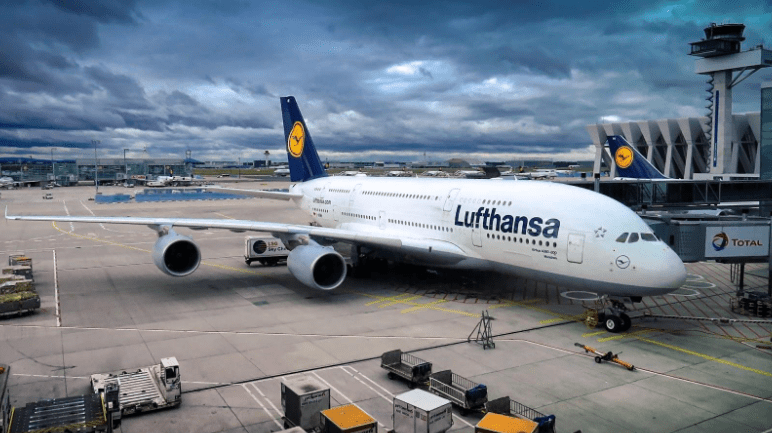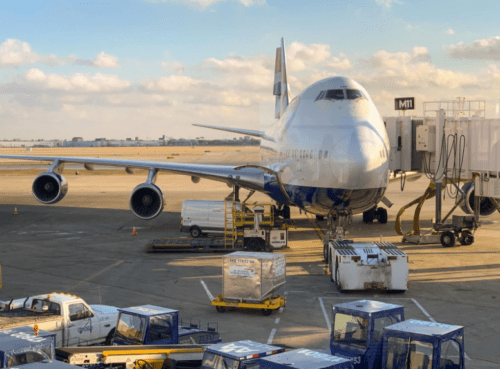9 Types of Air Cargo: A Guide To Transporting Goods by Plane

The ability to transport goods quickly, securely, and cost-effectively is crucial for many businesses. Air cargo offers a fast, reliable way of moving products around the world. It represents 35% of global trade by value to the tune of $6.8 trillion annually.
This guide provides a comprehensive overview of the different types of air cargo, their uses, and the specific requirements for each.
What Is Air Cargo?
Air cargo refers to transporting goods and products via aircraft, either in passenger aircraft cargo holds or cargo-only aircraft. It is a critical component of the global supply chain. It enables businesses to move goods quickly and efficiently over long distances, ensuring timely delivery and access to markets worldwide.
As a result, air cargo is a vital aspect of modern logistics and plays an essential role in the global economy. It connects manufacturers, suppliers, and consumers across the world.
The significance of air cargo in supply chain management cannot be overstated. It offers unparalleled speed and flexibility compared to other modes of transport, such as sea or ground shipping.
While air freight service can be more expensive than other options, its ability to transport goods rapidly and reliably makes it the preferred choice for time-sensitive, bulk, or high-value shipments.
Types of Air Cargo

With a solid understanding of the importance of air cargo and its role in the supply chain, let’s explore the nine distinct types of air cargo. We will also delve into their unique features and uses in various industries.
General Cargo
As the backbone of the air freight service industry, general cargo is a versatile and vital category. It covers a wide range of goods and products. This cargo can handle anything to do with electronics, clothing, machinery parts, medical supplies, and more. General cargo encompasses items that do not require specific handling or storage conditions during transportation.
Manufacturers, retailers, and businesses across numerous sectors depend on general cargo air freight services to transport their goods quickly and efficiently.
While specific restrictions and regulations may apply depending on the nature of the items, general cargo is typically more straightforward in terms of packaging and handling requirements. This category allows for streamlined operations, contributing to its substantial air cargo market share.
Special Cargo
Special cargo refers to goods that have unique requirements for handling, storage, or transportation. This category covers a diverse range of items, such as fine art, pharmaceuticals, sensitive equipment, or even live stage props for entertainment events.
The unique nature of these goods necessitates specialized care and attention, often involving additional security measures, temperature controls, or custom-designed containers.
Companies whose cargo includes museums and galleries, pharmaceutical companies, and event organizers rely on special cargo services to transport their valuable and delicate items safely and securely.
Air cargo providers offering special cargo services are well-equipped to handle the stringent regulations and standards associated with these goods. This ensures compliance and minimizes risks during transportation.
Live Animals
This type of cargo transports our furry, feathered, or four-legged friends through the skies. The specialized sector handles various creatures, from pets and farm animals to rare species destined for zoos and conservation centers. This way, they all receive the utmost care during their journey.
The live animal air cargo sector is essential in fostering connections across the globe and providing a reliable, humane way to transport the planet’s diverse inhabitants. Pet owners, breeders, farmers, and wildlife conservationists in the United States entrust live air freight with more than 2 million animals annually.
To guarantee the welfare and safety of every living passenger, air cargo providers follow strict guidelines laid out by the International Air Transport Association (IATA) in Live Animal Regulations.
Dangerous or Hazardous Cargo
The hazardous cargo category includes goods that pose a potential health, safety, or property risk during transportation. These items require special attention and handling to ensure the safety of air cargo personnel and cargo aircraft.
Air freight shipping of such items is subject to stringent oversight. The IATA provides the Dangerous Goods Regulations (DGR), the global standards for transporting hazardous materials by air. These types of cargo fall into nine categories, each with its own set of regulations stipulating packaging, labeling, documentation requirements, and guidelines for handling and storage:
- Explosives
- Flammable Gasses
- Flammable Liquids
- Flammable Solids
- Oxidizing
- Toxic and Infectious
- Radioactive
- Corrosives
- Miscellaneous, such as cargo requiring an elevated temperature, magnetized materials, and microorganisms.
Businesses that deal with chemicals, pharmaceuticals, and other industries requiring hazardous materials are the primary users of dangerous cargo air freight service.
High-Value or Fragile Cargo
The high-value or fragile cargo category consists of items with significant monetary value or that are prone to damage during transportation. Businesses and individuals shipping goods such as:
- Fine art
- Luxury goods
- High-end electronics
- Delicate musical instruments
- Precious gems or metals
All these require specialized handling and strong security measures to ensure their safe and secure transit.
Air cargo services provide these enhanced security measures, such as surveillance, secure storage facilities, and in some cases, a dedicated cargo escort. They also employ specialized packaging materials and handling techniques. This protects fragile items from damage during transport.
High-value or fragile cargo makes up a smaller portion of total air cargo transport than general cargo. Therefore it remains an essential service for numerous industries and clients seeking secure and reliable transportation for their valuable or delicate items.
Perishable Cargo
When it comes to perishable cargo, time is of the essence. Because they have a limited shelf life, these goods require specialized air cargo transport. It is essential for perishable cargo to reach its destination quickly and in the best possible condition. Fresh fruits, flowers, meats, seafood, and even temperature-sensitive pharmaceuticals are delicate items that fall under this category.
Perishable Cargo Regulations are in place to ensure the safe transportation of perishable cargo. Guidelines cover everything from proper packaging and temperature control to transit times.
Although perishable cargo is a smaller slice of the air cargo shipping pie, it’s essential for industries that rely on the prompt and efficient transportation of goods with a limited lifespan. For example, Africa’s burgeoning floriculture industry relies on specialized air cargo services to ensure the quality of its products.
Temperature Controlled Cargo
Temperature-controlled cargo is a game-changer for businesses that rely on precise temperature conditions during transportation. This specialized category is designed to maintain a consistent environment for goods sensitive to temperature fluctuations. The goal is that the goods arrive at their destination in perfect condition.
Industries that deal with temperature-sensitive goods, such as pharmaceuticals, chemicals, and food processing, rely heavily on temperature-controlled air freight services. These services employ advanced temperature-controlled containers and monitoring systems to maintain a consistent climate throughout the journey. By doing so, the cargo is protected from potential damage.
The IATA Temperature Control Regulations provide guidelines for packaging, temperature management, and handling procedures.
Mail Cargo
The mail cargo segment plays a pivotal role in the worldwide postal and parcel delivery network. It guarantees the prompt delivery of letters, documents, and packages to their intended destinations. Air freight handles approximately 328 billion letters and 7.4 billion packages annually, making mail cargo the most significant percentage of air shipment loads.
This air cargo category comprises personal correspondence and e-commerce purchases as well as essential business paperwork and small parcels, all requiring efficient transportation to bridge the global gap between people and businesses.
Users of mail cargo air freight services primarily include postal authorities, online retailers, and courier firms. These services collaborate closely with customs agencies to ensure compliance with international shipping regulations, which cover restrictions on specific items, weight constraints, and proper documentation.
Human Remains, Tissue, and Organ Cargo
Air transport is mission-critical in the delicate realm of human remains, tissue, and organ cargo. This category deals with transporting human remains for repatriation or funeral purposes. It also ships life-saving tissues and organs for transplants. Given the sensitive nature of these items, it is of the utmost importance that they are transported securely, respectfully, and efficiently.
The primary users of this specialized air cargo service include funeral homes, medical institutions, and organ transplant organizations. These services adhere to strict regulations and guidelines to ensure the ethical and safe transport of human remains, tissues, and organs. Relevant authorities, such as the World Health Organization (WHO) and IATA, provide comprehensive guidelines regarding the packaging, documentation, and handling procedures required for this type of cargo.
Organ procurement organizations (OPOs) are also working with cargo and passenger airlines to implement the UNOS Organ Tracking System. This collaboration improves the in-flight tracking system for donated organs in transit. As of December 2022, they have successfully tracked 7,000 organ shipments while providing up-to-the-minute information from loading to landing.
Frequently Asked Questions

In this Frequently Asked Questions section, we address some common concerns. Additionally, we provide valuable insights into regulations, accessibility to air cargo services for individuals and small businesses, and the environmental impact of air cargo.
What regulations apply to air cargo?
Air cargo is subject to international and national regulations, depending on the type of goods being transported and the countries involved.
The IATA, the World Customs Organization (WCO), and the Federal Aviation Administration (FAA) are key regulatory bodies. Regulations typically cover packaging, documentation, safety, and customs procedures.
Can individuals or small businesses use air cargo to transport goods?
Yes, air cargo services are available to individuals and small businesses. Many air cargo companies offer tailored solutions for small-scale shipments.
While the cost of air freight might be higher than other modes of transportation, it can be a viable option when speed, reliability, and security are crucial factors.
Does air cargo have an impact on the environment?
Like other modes of transportation, such as intermodal, air cargo has an environmental impact, primarily through greenhouse gas emissions.
The aviation industry continually works to minimize its carbon footprint by adopting fuel-efficient aircraft, optimizing flight routes, and investing in sustainable aviation fuels.
Final Thoughts
Understanding the various types of air cargo is essential for businesses and individuals planning to transport goods by plane. Each category has its unique requirements, regulations, and applications, addressing the diverse needs of the global supply chain.
As the air cargo industry evolves, it remains vital to global trade and logistics. By focusing on these different types of air cargo, this article is intended to provide valuable insights for those seeking to make informed decisions when transporting goods by air.
Remember the various options and their specific considerations to ensure every shipment arrives safely, securely, and on time.
